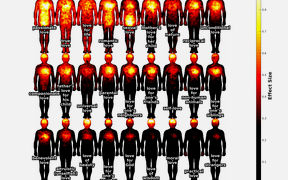Department of Computer Science
We are an internationally-oriented community and home to world-class research in modern computer science.

Kaisa Nyberg's career has taken her from radio encryption algorithms to international standardisation work and finally to professor at Aalto University. According to Nyberg, the biggest contribution of her career lies in her role as a mentor to students

Study reveals that some coping strategies only make the problem worse

The impact of creative AI is unfolding before our eyes, yet we struggle to understand it. It’s the perfect time to ask researchers what they see and think.

The privacy policies and practices of online games contain dark design patterns which could be deceptive, misleading, or coercive to users, according to a new study from Aalto University

New research sheds light on where and how we feel different kinds of love

We are an internationally-oriented community and home to world-class research in modern computer science.

The Finnish Center for Artificial Intelligence FCAI is a research hub initiated by Aalto University, the University of Helsinki, and the Technical Research Centre of Finland VTT. The goal of FCAI is to develop new types of artificial intelligence that can work with humans in complex environments, and help modernize Finnish industry. FCAI is one of the national flagships of the Academy of Finland.



